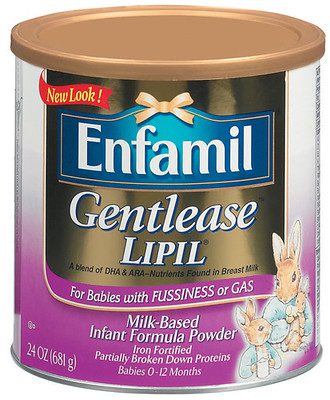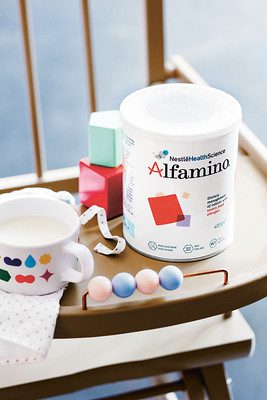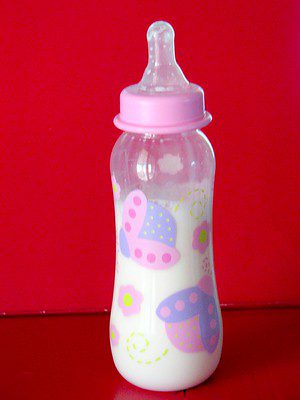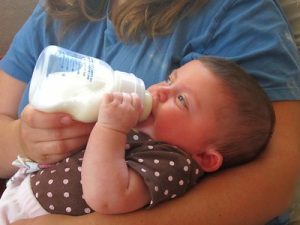Gas is a common problem in infants causing a lot of discomfort for the infant and a range of symptoms such as fussiness, colic, bloating, abdominal pain, and gas problems. However, some formula options can help alleviate these symptoms, providing both parents and infants the relief they need.
 Source: pxhere.com
Source: pxhere.com
There are some natural remedies for this situation including drinking more water and eating more vegetables, but some formula products can also help relieve gassy feeling.
This article will discuss some of the manufactured formula options and why they are good for infants.
A Baby With Gassy Feeling
Parents may be alarmed if their baby is experiencing discomfort caused by the gassy feeling in their intestines. This incidence, on the other hand, is quite common, particularly in newborns. Fortunately, most instances may be treated at home.
Frequent irritability, loose or foul-smelling stool, difficulties nursing and/or sleeping, and long bouts of crying are all signs that your baby has a more serious problem than a simple gassy feeling. These could be signs of food intolerance or colic.
On the other hand, discomfort due to trapped air can be typical in infants who are otherwise healthy and well-fed and not indicative of a medical issue. Find out what causes pain due to gassy issues in your baby and how to relieve it if it occurs regularly if this is the case.
In the first year of your baby’s life, gassiness may be connected to baby reflux. This can be possible through many of the same causes that cause reflux.
- The digestive system is still maturing.
- Long periods of resting on your back
- Digestive concerns such as food intolerance (like lactose sensitivity)
- Those who suffer from a dairy allergy
- Excessive air intake while breastfeeding with formula.
- If you’re breastfeeding, avoid certain foods (dairy, broccoli, and other cruciferous veggies, as well as spicy food).
If your baby is experiencing pain, don’t be alarmed; it’s rarely life-threatening. Babies with this issue tend to be more irritable and cry.
The good news is that some things can help your problem with your gassy baby.
- Some formula for gassy babies tries to be like breast milk by adding things like prebiotics, probiotics, and human milk oligosaccharides, which are found in breast milk and help keep the digestive system healthy.
- Moreover, there is also whey protein-lipid concentrate, a combination of whey protein and milk fat, which are key ingredients in some best formula brands for gassy babies as it can be easier to digest and may help reduce gassy feeling and fussiness compared to traditional milk-based formula options.
Best Baby Formula Options For Gas
The following are the best-manufactured milk for babies. These are the top milk that are designed to be easier for gassy babies to digest:

Enfamil Gentlease
The Enfamil Gentlease baby formula is designed to minimize crying, gassy issues, and fussiness within 24 hours.
- This milk-based formula for gassy babies contains partially broken-down proteins.
- Lactose accounts for 20% of the carbohydrates in this formula, making it suitable for newborns with transitory lactase insufficiency.
- Gentlease is a milk-based newborn formula designed to relieve fussiness, gas, and crying. The infant formula of Enfamil Gentlease is 20 Cal/fl Oz.
- Because it’s been partially digested, it contains a milk protein combination modeled after breast milk ( with a whey and casein ratio of 60:40).
- In addition to the minerals contained in breast milk, the formula contains docosahexaenoic acid (DHA), as well as arachidonic acid (ARA).
- This infant formula is free from harmful ingredients such as corn syrup solids.
 Source: flickr.com
Source: flickr.com
Gerber Good Start Soy
This top baby formula for gas helps infants alleviate flatulence and fussiness caused by formula or lactose intolerance while offering balanced nutrition. Everyone benefits when their baby is comfortable.
- This best baby formula of Gerber Good Start Soy is soy-made milk that is clinically proven to be a hypoallergenic formula for babies, and free from corn syrup solids.
- The formula is lactose-free milk and a supplement that contains soy protein. Soy protein is used in one of these best baby formulas to make it easier for children with milk or lactose intolerance to consume it during formula feeding.
- DHA and soy protein are found in this baby formula, it is an essential nutrient for brain development and visual function as advised by experts.
Similac Soy Isomil
In terms of comprehensive soy nutrition, Similac Soy Isomil Baby Formula is unsurpassed. It is one of Earth’s best.
- The formula is a highly nutritious, soy-based baby milk that is iron-fortified and lactose-free for your little one.
- Soy-based milk is one of the best baby kinds of formula. The formula can be a good choice for gassy babies who are allergic to or can’t handle the protein in cow’s milk. They are made from soy protein isolate, which is purely soy oil, which is easier to digest and less likely to cause gas and colic.
- Special nutrients like the milk fat globule membrane contained in breast milk assist in boosting a baby’s brain and eye development. The hypoallergenic formula of OptiGRO Similac is its own combination of DHA, vitamin E, soy protein, and Lutein.
- In addition to being lactose- and milk-free, Similac Soy Isomil hypoallergenic formula is also soothing to a baby’s stomach, making it an ideal choice for those powdered formula-fed babies who have trouble sleeping due to gas or fussiness. Premature babies (those born weighing less than 1800 grams) should not be fed soy-based milk, organic, hydrolyzed, hypoallergenic, or lactose-free.
- In addition, this formula is proven safe and has no artificial growth hormones and corn syrup solids. Its primary source of fat is vegetable oil, including soy oil, as a source of essential fatty acids and other nutrients.
Parent’s Choice Gentle Formula
Similac Total Comfort
This Spanish-produced powdered milk is comparable to Similac Pro-Total Comfort in the United States.
- It is one of the infant formula brands that is simple to digest for infants with sensitive tummies, and it contains 2′-FL and nucleotides to strengthen your child’s immune system. The formula contains key nutrients such as whey powder and vegetable oils.
- Breast milk and many standard infant formula brands contain lactose as the primary carbohydrate. However, for babies with lactose sensitivity, alternative carbohydrates like corn syrup or maize maltodextrin are included in certain formulas. The formula meets the requirements set by the US FDA for the temporary importation of powdered infant formula made outside the US, particularly beneficial for sensitive babies.

Nestlé Alfamino Baby Formula
Infants aged 0-12 months who are allergic to cow’s formula proteins and have numerous food allergies, or malabsorptive disorders can benefit from Alfamino® Infant’s hypoallergenic amino acid formula.
- A special fat blend incorporating medium chain triglycerides (MCT) alleviates cow’s milk allergy and aids fat absorption in this nutritionally balanced milk, which delivers important nutrients (including DHA and ARA) for growth and development.
- This formula is a good example of a traditional formula adapted for modern health needs.
- Corn syrup solids are a source of carbohydrates in Alfamino. Corn syrup solids are added to replace lactose in the milk.
- This formula reduces the risk of additional allergic responses in a baby with a Cow’s Milk Protein Allergy.
- With an elemental diet, the formula provides all the nutrients needed to keep EoE at bay.
- The formula reduces the risk of additional allergic responses in a baby with a Cow’s Milk Protein Allergy. Supplementation for children with SBS who may benefit from an amino acid-based milk brand without any artificial growth hormones.
- In times of gastrointestinal distress, the formula offers the best organic baby milk with MCT that is easily absorbed to have a more readily available energy source. It aids in the development of healthy babies.
 Source: flickr.com
Source: flickr.com
Remedies Of Formula-Fed Flatulent Infants
Aside from giving your baby the right formula for gassy issues (whether it’s organic, hypoallergenic, or lactose-free formula) without any artificial growth hormones, here are other ways you can relieve your little one’s discomfort:
-
- After preparation, wait a minute before using the best formula for gassy babies because shaking can introduce more air bubbles.
- Invest in anti-colic baby nipples or bottles.
- Several times throughout feeding, burp your child.
- Modify the timetable to include smaller but more often meals. After each feed, position the infant upright for 20 to 30 minutes.

Conclusion
Best Formula For Gassy Babies FAQs
Should I Switch Formula If The Infant Is Gassy?
If your baby is feeling gassy, you might want to consider changing the formula as a possible solution. The gassy feeling can be caused by a number of things, like an allergy to some of the ingredients in the formula or a gut system that isn’t fully developed yet. But before you make any changes, it’s important to talk to your baby’s doctor to find out what’s right for his or her needs.
Here are some things to think about and talk about with your baby’s doctor:
- If your baby is on a formula made from cow’s milk, it may be hard for them to break down the proteins, which can cause gas. Your child’s doctor might suggest switching to a different kind of milk, like one that has been partly or fully broken down. The proteins in these recipes are broken down into smaller pieces that are easier to digest.
- Think about lactose intolerance. Some babies have trouble processing lactose, a sugar found in formulas made with milk. If your baby shows signs of not being able to handle lactose, your doctor may suggest switching to another formula that doesn’t have lactose or is made with soy. Babies who can’t handle lactose can get their nutrition from these foods instead.
- Talk about allergies or sensitivities. Your baby’s doctor can help you figure out if he or she is allergic or sensitive to any of the ingredients from the formula, such as cow’s milk protein or soy. If necessary, they may suggest moving to a formula that has been broken down a lot or one that is made up of amino acids.
- If you do decide to switch foods, you should give it some time to see if it helps your baby’s gas problems. It can take a few days or even weeks for a baby’s gut system to get used to a new formula. During this time of formula switch, keep an eye on your baby’s symptoms and talk to your doctor for advice.
Don’t forget that it’s important to include the doctor of your baby in the decision-making process. They know how to figure out what your baby needs and can give you specific advice based on his or her health background and specific symptoms.

What Formula Or Milk, Aside From Breast Milk, Is Ideal To Be Used By Infants With Colic Issues?
Choosing the right formula for colic and gassy feeling depends on your baby’s unique needs. But there are a few kinds of formula that are often suggested for babies who have colic or gassy problems. It’s important to remember that talking to your pediatrician is the right way to figure out which formula is ideal for your baby.
- Partially hydrolyzed proteins: These have proteins that have been partially broken down, which makes them easier to digest. They can help kids who have colic or gas problems because they are sensitive to the proteins in cow’s milk. Enfamil Gentlease, Similac Pro-Total Comfort, and Gerber Good Start Soothe are some examples.
- Extensively hydrolyzed milk: The proteins in this milk have been broken up into small pieces, which can make them easier for babies to swallow. They are usually suggested for babies with more serious allergies or sensitivities to milk proteins. Examples include Nutramigen or Alimentum.
- Lactose-free formula: Babies who can’t digest lactose may be able to use lactose-free feeds. For energy, these recipes replace lactose with other types of carbohydrates. Similac Sensitive or Enfamil ProSobee are two examples.
- Soy-based formula: Babies who can’t handle lactose or the protein in cow’s milk can use soy-based formula instead. But it’s important to know that some kids who are allergic to the protein in cow’s milk may also be allergic to soy. Enfamil ProSobee or Similac Soy Isomil are two examples.
Again, you should talk to the doctor of your baby before making any changes to his or her food. They can look at your baby’s needs, medical background, and symptoms to figure out the best milk to help with colic and gassy issues.
Which Enfamil Formula Is Good For Gas?
Is s26 Formula Good For Babies?
What Is The Healthiest Formula For The Babies?
Is Similac Considered A Good Formula For Babies?
What Formula For Infants Is Easiest To Digest?
Which Similac Formula Is Closest To Breastmilk?
Is Similac Formula Better Than Enfamil Formula?
Why Is Enfamil So Expensive?
What Is The Most Expensive Infant Formula?
What Is The Best Similac Formula For Easy Digestion?
What Are The Side Effects Of Similac?
What Baby Formulas Are Good For Gassy Issues And Reflux Newborns?
Which Formula Causes Less Gassy Feeling?
Last Updated on May 13, 2023 by Rejie Salazar
DISCLAIMER (IMPORTANT): This information (including all text, images, audio, or other formats on FamilyHype.com) is not intended to be a substitute for informed professional advice, diagnosis, endorsement or treatment. You should not take any action or avoid taking action without consulting a qualified professional. Always seek the advice of your physician or other qualified health provider with any questions about medical conditions. Do not disregard professional medical advice or delay seeking advice or treatment because of something you have read here a FamilyHype.com.